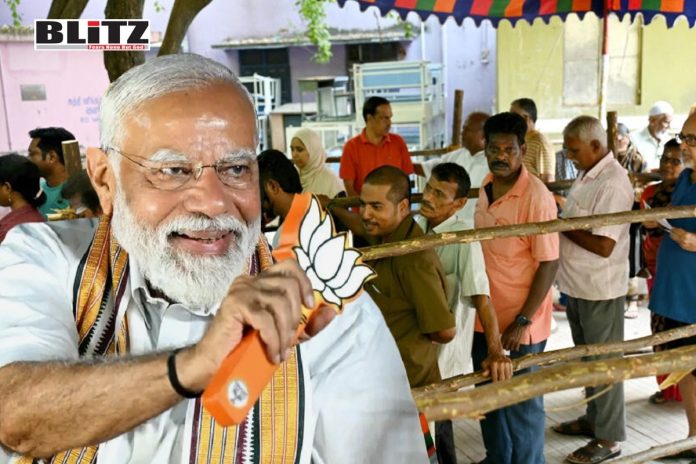The world’s largest democracy, India, has embarked on its highly anticipated six-week-long election, drawing attention to Prime Minister Narendra Modi and his Bharatiya Janata Party (BJP). With an astonishing 968 million eligible voters, this electoral process transcends mere democratic ritual; it mirrors India’s dynamic political terrain, offering a glimpse into its ever-evolving landscape. All eyes are firmly fixed on the unfolding drama as the nation navigates through this pivotal moment in its democratic journey.
Narendra Modi, the 73-year-old Hindu nationalist leader, remains a towering figure in Indian politics. After a decade in power, his popularity has shown little sign of waning. His tenure has been marked by India’s rise as a diplomatic and economic powerhouse. From his vantage point, he has often championed the cause of the Hindu majority, bringing faith and politics into a closer alignment.
Before the election, Modi’s connection with the Hindu community was unmistakable. In Haridwar, a revered city, voters lined up with calm determination outside polling stations, reflecting their faith in Modi’s leadership. Many shared their belief that under Modi’s governance, both the nation and their religious beliefs were safeguarded. Uday Bharti, a 59-year-old Hindu ascetic, voiced this sentiment, stating, “Modi has ensured the security of our country and our faith.” His words resonated with numerous others who felt similarly.
Further cementing his image as a Hindu champion, Modi oversaw the inauguration of a grand temple dedicated to the deity Ram. This monumental achievement, built on the site of a centuries-old mosque, fulfilled a long-standing demand of Hindu activists and was met with widespread celebration across India.
While Modi stands strong with a commanding presence, the opposition appears fragmented and lacking cohesion. A discordant coalition of over two dozen parties struggles to rally behind a single candidate for prime minister, failing to forge a united front. Rahul Gandhi, representing the Congress party, India’s principal opposition, has candidly acknowledged their financial struggles, remarking, “We lack the funds for campaigning and supporting our candidates.” This admission underscores the challenges faced by the opposition in presenting a formidable challenge to Modi’s leadership.
The opposition’s challenges have been exacerbated by legal troubles. Several criminal probes into opposition leaders and a tax investigation freezing Congress’s bank accounts have further weakened their position. Accusations have flown, with the opposition and human rights organizations alleging that these probes are politically motivated attempts by Modi’s government to sideline rivals.
Under Modi’s leadership, India has ascended the economic ranks, surpassing its former colonial ruler, Britain, to claim the position of the world’s fifth-largest economy. Western countries have sought to strengthen ties with India, viewing it as a potential ally to counterbalance China’s growing regional influence. Yet, there are growing apprehensions regarding the curbing of India’s formerly dynamic press and the tightening restrictions on civil society, raising questions about the state of democratic freedoms in the country.
Rights groups like Amnesty have faced curtailments in their operations, and even international media hasn’t been immune. Last year, the tax office raided the BBC’s local offices following a documentary questioning Modi’s role in religious riots from 2002.
Despite these concerns, Modi’s government touts its achievements in economic growth and diplomatic relations as evidence of its successful governance.
Although India’s constitution upholds secularism, the ascent of Hindu nationalism during Modi’s tenure has sparked unease among minority groups, notably the 220 million Muslims. Increasing polarization along religious lines has resulted in a noticeable decline in trust between Hindu and Muslim communities.
Abdul Basit, a 25-year-old restaurant owner from Muzaffarnagar, lamented the deepening divide, saying, “They have polarised along religious lines so much that there is no trust left between Hindus and Muslims.”
As voting began, the focus shifted to ensuring a free and fair electoral process. While the first phase of voting was largely peaceful, an incident in conflict-hit Manipur served as a grim reminder of the challenges India faces. A polling station was ransacked after unknown assailants fired gunshots outside. The state has been fraught with ethnic tensions, with clashes between the Hindu Meitei majority and the mainly Christian Kuki community leading to displacements.
With six more rounds of voting scheduled between April 26 and June 1, the electoral battle is far from over. The results, eagerly awaited, will be announced on June 4, after all ballots have been counted.
The 2024 elections in India stand as a pivotal moment, examining Modi’s lasting appeal, the opposition’s strength, and the nation’s dedication to democracy. As millions head to the polls, global eyes are fixated, eager to discern the results that will shape India’s political trajectory in the foreseeable future. This electoral contest not only tests leadership but also underscores the electorate’s aspirations and the nation’s evolving political landscape.




